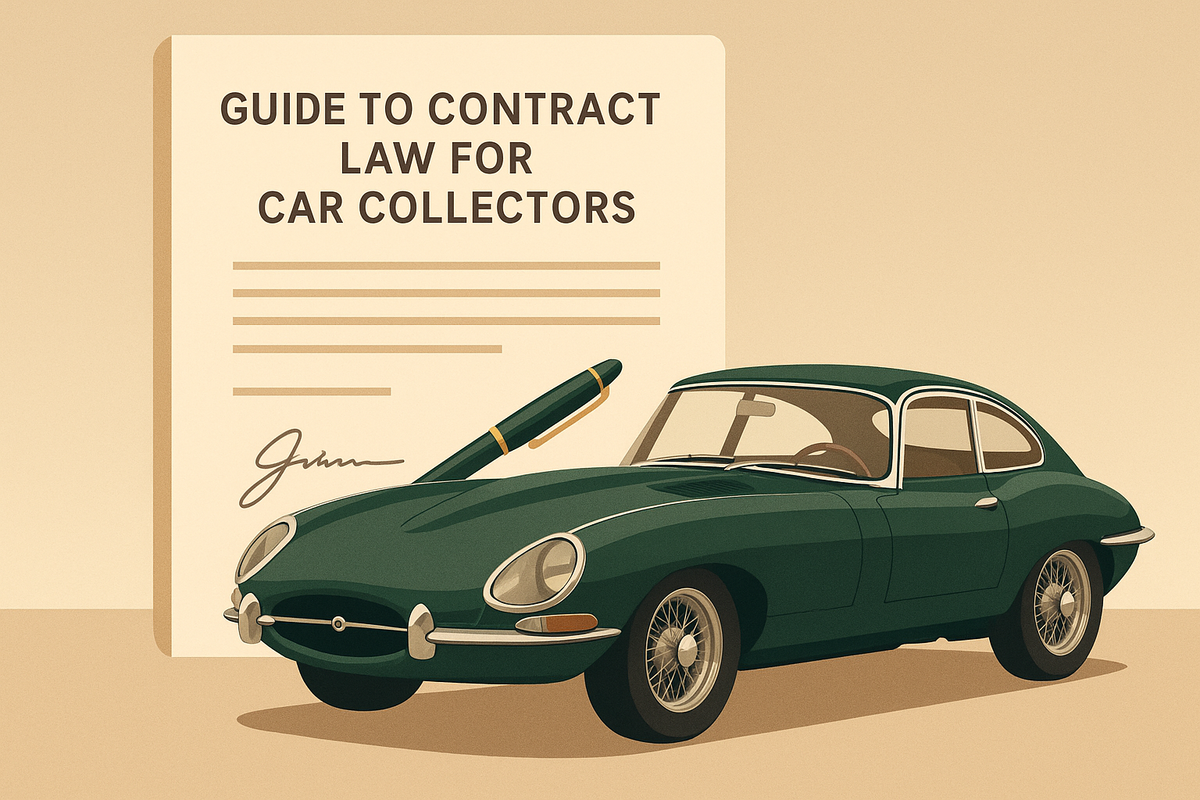Guide to Contract Law for Car Collectors
Understand the essentials of UK contract law for collectible car transactions to safeguard your investment and avoid disputes.

Buying or selling a collectible car? Here's what you need to know about UK contract law to protect your investment:
- Key Elements for a Valid Contract: Every car sale agreement must include an offer, acceptance, consideration (exchange of value), and intent to form a legal relationship.
- Core Requirements: Clearly outline price, vehicle details (e.g., VIN, condition), delivery terms, and payment schedules. Use written contracts for high-value vehicles.
- Payment and Delivery: Specify deposit amounts (usually 10–20%), payment methods (e.g., bank transfer), and delivery protocols (e.g., insurance, inspection).
- Dispute Resolution: Include mediation or arbitration clauses to handle disputes quickly, avoiding costly court cases.
- Special Considerations for Rare Cars: Verify provenance, ownership history, and restoration records. Address VAT, import duties, and tax compliance for international transactions.
- Essential Documents: Ensure you have the V5C logbook, heritage certificate, service history, MOT records, and restoration documentation.
Tip: Always rely on detailed written contracts and consult a solicitor for high-value transactions. Proper documentation not only safeguards your rights but also enhances resale value.
Traders Are DENYING Your Rights!
Core Contract Requirements
Core contract requirements are essential to protect both parties and ensure legal validity in high-value car transactions within the UK.
Making and Accepting Offers
The offer process in car sales must be straightforward and clearly outlined. When making an offer, the following details are crucial:
| Offer Component | Required Details | Legal Implications |
|---|---|---|
| Price Terms | Full amount in £, payment schedule | Must be precise and documented |
| Vehicle Details | Registration, VIN, condition report | Ensures correct car identification |
| Delivery Terms | Collection/delivery date, location | Establishes transfer responsibilities |
| Special Conditions | Restoration requirements, parts included | Prevents future disputes |
Providing clear and specific details helps establish a valid offer. Written documentation is strongly recommended for high-value vehicles. On MARQHAUS, offers are securely recorded to capture all terms accurately.
Legal Agreement Between Parties
Both parties must clearly show their intention to form a legally binding agreement. This involves:
- Legal capacity for both parties
- Clear and complete terms
- A genuine intent to create legal relations
- Freedom from duress or misrepresentation
For investment-grade vehicles, verifying provenance and ownership history is a critical part of the process. Once these elements are in place, the next step is to ensure a transparent exchange of value.
Exchange of Value
The exchange of value, based on the principle of consideration, must be carefully detailed in car sales.
1. Monetary Exchange
Key details for monetary exchange include:
- Total price in £
- Payment schedule, including deposits or instalments, and accepted payment methods
- Currency conversion terms, if applicable
2. Additional Value Elements
Other elements that may contribute to the transaction include:
- Part-exchange vehicles
- Restoration services
- Spare parts or accompanying documentation
- Storage arrangements
3. Timing and Completion
It’s important to specify:
- Payment verification procedures
- Timing of ownership transfer
- Handover of documentation
- Registration transfer processes
For high-value car sales, thorough documentation and verification of all aspects of the value exchange are essential to ensure the transaction is secure and legally compliant.
Contract Terms and Dispute Handling
Payment and Delivery Rules
It's crucial to outline clear payment terms to protect both buyer and seller. The contract should state the total price in pounds sterling, along with payment schedules and acceptable methods. For high-value transactions, sellers often require a deposit of 10–20% of the vehicle's value.
| Payment Component | Required Details | Legal Requirements |
|---|---|---|
| Deposit | 10–20% of sale price | Non-refundable terms clearly stated |
| Payment Method | Bank transfer or escrow | Compliance with anti-money laundering laws |
| Timeline | Full payment within 7 working days | - |
| Documentation | VAT status and invoicing | Must meet HMRC standards |
These terms not only ensure security but also guarantee compliance with legal obligations.
Delivery terms should be equally precise. Solicitor Emma Whitfield recommends using GPS tracking for vehicles valued over £100,000 during transit.
Key delivery requirements include:
- Inspection Protocol: A pre-delivery condition report from FIA-certified engineers.
- Handover Process: Documentation confirming the vehicle's identity.
- Storage Conditions: Transit temperature controlled below 25°C.
- Transport Insurance: Coverage for the vehicle's full value.
By addressing these specifics, you can minimise risks and create a solid foundation for handling any disputes.
Solving Contract Problems
Even with thorough payment and delivery terms, disputes can arise. UK law provides clear processes for resolving such issues. According to Motor Ombudsman data, mechanical defects (41%) and misrepresentation (33%) are the most common causes of disputes.
To manage disputes effectively, contracts should include a clear escalation process:
| Stage | Timeframe | Cost Range | Success Rate |
|---|---|---|---|
| Initial Mediation | 2–6 weeks | £0–£175 | 85% |
| County Court | 6–18 months | £455–£10,000+ | 68% |
| High Court | 12–36 months | £15,000+ | 73% |
Alternative Dispute Resolution (ADR) is particularly effective, resolving 85% of cases before they reach court. The process typically starts with a formal written notice sent via Recorded Signed For service, followed by a 14-day mediation period with ADR Group-certified mediators.
A recent case highlights the importance of clear payment terms:
"In Smith v. Classic Autos Ltd, the High Court ruled against a buyer who failed to pay via the agreed bank transfer, underscoring the need for explicit payment clauses."
For imported vehicles, the contract should state whether the price includes 20% VAT, ensure compliance with post-Brexit import duties, and clarify who is responsible for NOVA registration.
HMRC data from Q1 2024 revealed £6.8 million collected in classic car import duties, showing how critical proper tax planning is for international transactions.
Under the Limitation Act 1980, you have six years from the breach date to make a claim. However, ADR often provides faster and more cost-effective solutions. The Motor Ombudsman scheme, for instance, uses specialist arbitrators for classic car disputes, resolving cases in an average of 11 weeks compared to 26 weeks in court.
Contracts for Rare and Classic Cars
Rare and classic car transactions come with unique challenges, requiring extra care in verification and legal details.
Price and Origin Verification
Getting the value and history right is crucial. Use expert assessments to confirm the car’s authenticity, history, and condition. MARQHAUS specialists suggest adding specific clauses to address:
- Unbroken ownership history for historical vehicles
- Verification of original build details
- Confirmation of any competition history
- Documentation of restoration or modifications
These steps go beyond standard contract terms, ensuring the unique aspects of historic cars are properly addressed.
Tax and Legal Requirements
Buying or selling classic cars often involves intricate tax and legal considerations. Clearly outline who is responsible for handling taxes, duties, and import/export paperwork.
Include terms covering Capital Gains Tax, VAT, import duties, and necessary documentation for imports or exports. Work with legal and tax experts to ensure everything complies with HMRC rules and regulations.
Protecting Your Car Purchase
Required Documents
Having the right paperwork is crucial when buying a car. It confirms ownership, verifies the car's condition, and ensures all legal requirements are met. Here's what you need to check:
| Document Type | Purpose | Key Information Included |
|---|---|---|
| V5C Registration | Confirms ownership | Details about the vehicle's history and previous keepers |
| Heritage Certificate | Verifies originality | Information on the car's original specifications and build date |
| Service History | Tracks maintenance | Records of servicing, complete with garage stamps |
| MOT Certificates | Proves roadworthiness | Past MOT records showing mileage trends |
| Restoration Records | Details repairs | Documentation of repairs and replaced parts |
These documents ensure a smooth transfer of ownership and help you comply with UK regulations. Always review them carefully before finalising your purchase.
Summary
This section pulls together the key elements of a contract to help you finalise your car purchase with confidence. Contract law ensures your investment in a collectible car is safeguarded by clarifying the obligations of both buyer and seller.
When completing a classic car purchase, pay close attention to the following:
| Contract Component | Key Considerations | Legal Protection |
|---|---|---|
| Core Requirements | A valid offer, acceptance, and clear terms | Ensures it can be enforced in court |
| Documentation | V5C logbook, heritage certificates, service history | Confirms ownership and legitimacy |
| Payment Terms | Agreed price, deposit details, and transfer method | Secures your financial interests |
| Delivery Details | Collection or delivery specifics, condition checks | Avoids disputes over the car's state |
| Legal Compliance | VAT, import duties, and registration requirements | Ensures adherence to regulations |
Relying on verbal agreements can leave you vulnerable. Always insist on a detailed written contract.
Consider using MARQHAUS's verification services and their contract templates for added peace of mind. For high-value purchases, having a solicitor review the contract can help prevent expensive disputes. Keep all related documents well-organised and easily accessible.
Thorough documentation not only protects your legal rights but can also enhance the car's resale value in the future.
FAQs
What key legal documents should I have when buying a collectible car in the UK?
When purchasing a collectible car in the UK, it’s essential to secure the right legal documents to ensure a smooth and legitimate transaction. Here are the most important ones to have:
- The Vehicle Registration Certificate (V5C): This document proves ownership and contains key details about the car, such as its make, model, and registration number. Ensure the seller’s details match those on the V5C.
- A Bill of Sale or Purchase Agreement: This serves as a written record of the transaction, outlining the agreed price, vehicle details, and the terms of sale. Both parties should sign and retain a copy.
- MOT Certificate: If the car is over three years old, request the latest MOT certificate to confirm it meets UK road safety standards.
Additionally, consider verifying the car’s history through a vehicle history check to ensure there are no outstanding finance agreements or undisclosed issues. These steps can help protect your investment and avoid potential disputes later on.
How can I verify the provenance and ownership history of a rare or collectible car?
To ensure the provenance and ownership history of a rare car are accurate, start by requesting all available documentation from the seller. This might include logbooks, service records, and any historical certificates. Cross-check these details with official records, such as the DVLA in the UK, to confirm ownership and registration history.
For added assurance, consider hiring a professional appraiser or specialist with expertise in collectible cars. They can conduct a thorough inspection and verify the car's authenticity and history. It's also wise to research the car's background through reputable sources, including auction records or marque-specific clubs, to uncover any potential discrepancies or red flags.
How can I resolve a dispute with a buyer or seller of a classic car without going to court?
If you're facing a dispute over a classic car transaction, there are several steps you can take to resolve the issue without resorting to court proceedings:
- Communicate directly: Start by discussing the issue with the other party. Clearly outline your concerns and try to reach a mutually agreeable solution.
- Review the contract: Check the terms of your written agreement for any clauses related to dispute resolution, refunds, or warranties. This can provide guidance on how to proceed.
- Seek mediation: Engage a neutral third party, such as a professional mediator, to help facilitate a resolution. Mediation is often faster and less expensive than going to court.
- Consult legal advice: If the dispute remains unresolved, consider seeking advice from a solicitor who specialises in contract law or classic car transactions.
Taking these steps can help you resolve the matter amicably and avoid the time and expense of litigation.




